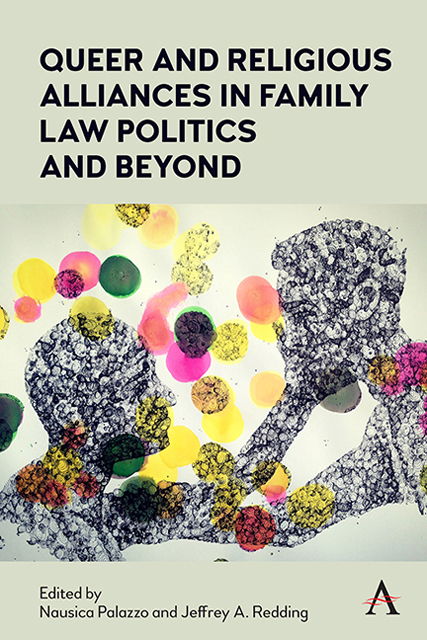Chapter 8 - Queer Politics, Consensual Nonmonogamy, and Religion: Notes on the Ethics of Coalition Work
Published online by Cambridge University Press: 09 December 2022
Summary
How can queer activism contribute to gaining recognition and material support for a plurality of nonnormative relationships and families, including Consensual Nonmonogamies (CNMs) and polyamories? What is the significance of coalition work in queer legal politics around relational rights? What kind of coalitions may be conducive to intersectional queer politics for social justice and what kind of coalitions may obstruct such a goal? In this chapter, I engage in a series of interrelated reflections on queer politics, religion, and the ethics of coalition work around the legal recognition of relationships not matching the normative pattern of heterosexual dyadic organization. Its main focus is on the potential of coalitions between queer and religious groups.
The chapter argues that coalitional practice forms a key element of queer politics and that coalitions between queer and religious groups are in principle welcome. I further argue that queer and religious groups do not form mutually exclusive populations and that the boundaries between the secular and religion appear to be much fuzzier than usually acknowledged if we carefully examine the history of core political concepts, including those commonly structuring queer politics. Inasmuch as CNM is concerned, the observation that both secular and new-age polyamory and conventional religious polygamy face legal discrimination in many jurisdictions provides valid reasons for considering coordinated responses. Apart from a shared interest in relationship recognition beyond dyadic relational forms, the racist denigration of indigenous CNMs or Muslim polygamy in white settler societies and Western (majoritarian Christian) countries invites coalitions around anti-racism as an integral part of intersectional queer social justice politics. At the same time, I suggest that fruitful coalition work is best founded on a set of shared values, which renders queer coalition work with groups that are overtly hostile toward LGBTQI+ people inherently problematic. Foregrounding the need to carefully consider the ethical grounds for coalitional practice, the chapter rejects proposals that queer agendas could be advanced through strategic coalitions with conservative religious groups whose major motivation for action is the preservation of civil marriage as an exclusively heterosexual institution. Queer politics strives for an ethics of inclusivity and entails the affirmation of nonnormative ways of life.
- Type
- Chapter
- Information
- Queer and Religious Alliances in Family Law Politics and Beyond , pp. 147 - 172Publisher: Anthem PressPrint publication year: 2022

